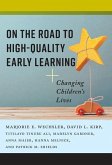To improve this broken system of equitable education, educators need professional development to recognize and address their biases. Schools must also implement policies that promote equity in discipline, special education placement, and access to extracurricular opportunities. Equitable instructional practices involve challenging African American students with a rigorous curriculum that prepares them for college and careers while providing the necessary support to help them meet those high expectations. When we advocate for educational justice, we are require society to acknowledge the historical wrongs that created the educational divide. While actively working to right the wrongs. In our advocation, we desire that the educational system see African American children not just as students but as powerful individuals capable of their destinies. Only through educational justice can we create an educational landscape that is truly equitable. African American children should have the space and support to reach their fullest potential. Until justice is achieved, educational peace remains elusive, and the struggle for educational justice will continue to be an urgent cause. Societal inequities, including systemic racism, often manifest in the education system through discriminatory practices, biased curriculum, and unequal access to quality education. These factors contribute to the achievement gap between African Americans and their peers. Therefore, many African American communities face economic challenges that affect educational opportunities. Schools in economically disadvantaged areas often lack adequate funding, leading to fewer resources, larger class sizes, and outdated materials. Furthermore, housing segregation continues to impact African American students by confining many under-resourced schools in segregated neighborhoods. This limits their access to high-quality education and perpetuates cycles of poverty.
Hinweis: Dieser Artikel kann nur an eine deutsche Lieferadresse ausgeliefert werden.
Hinweis: Dieser Artikel kann nur an eine deutsche Lieferadresse ausgeliefert werden.








